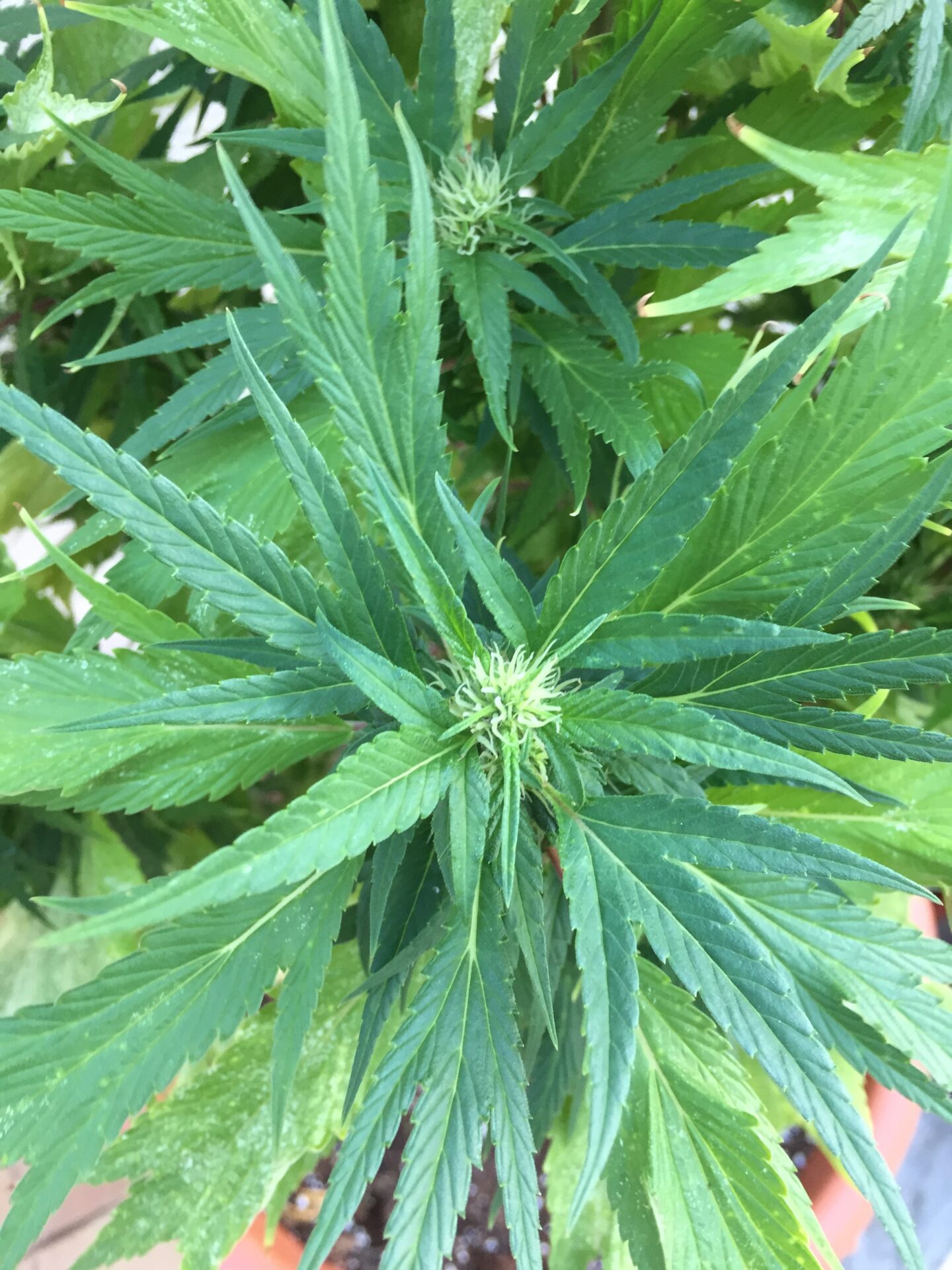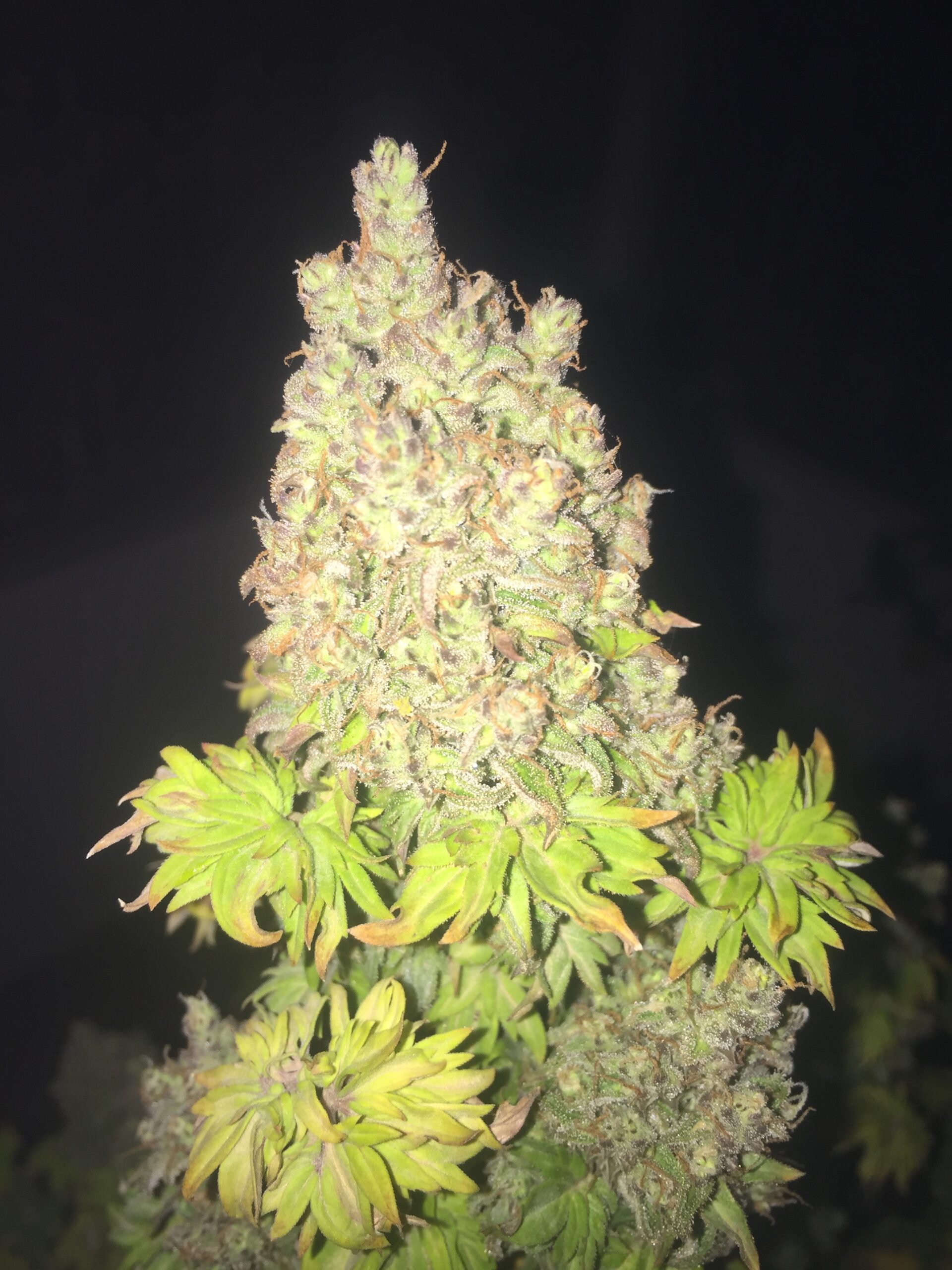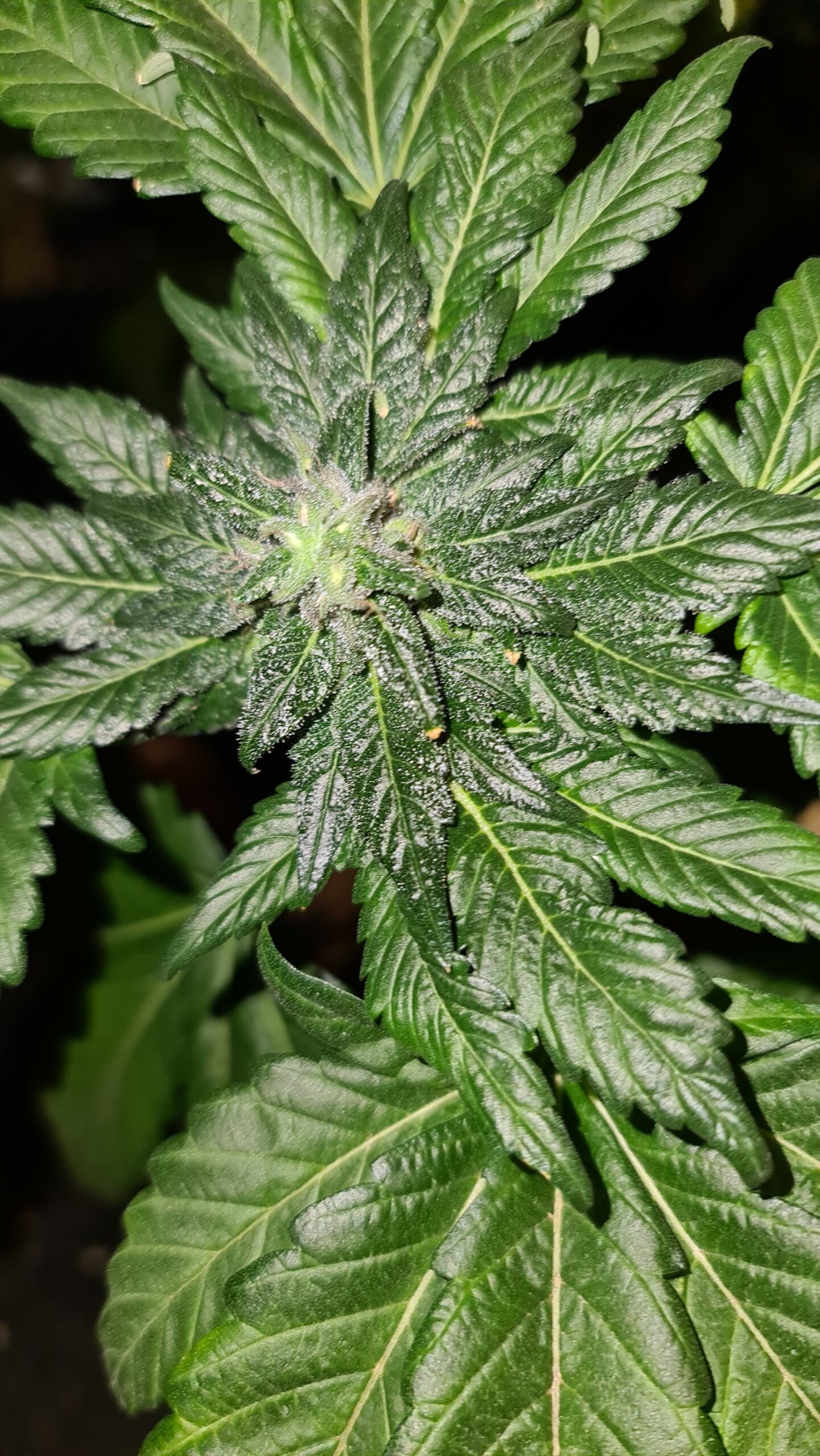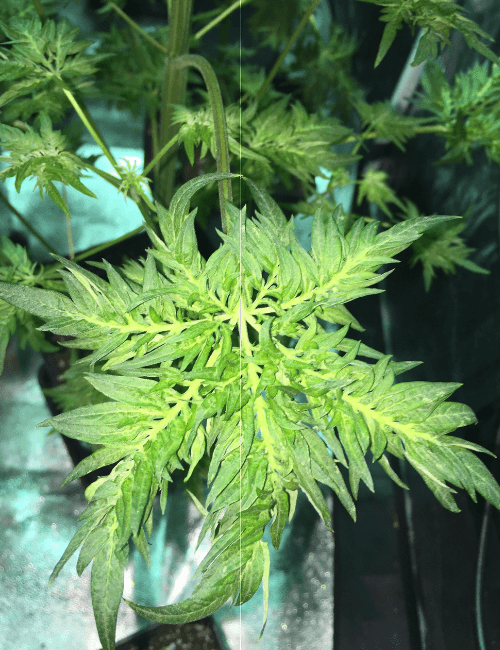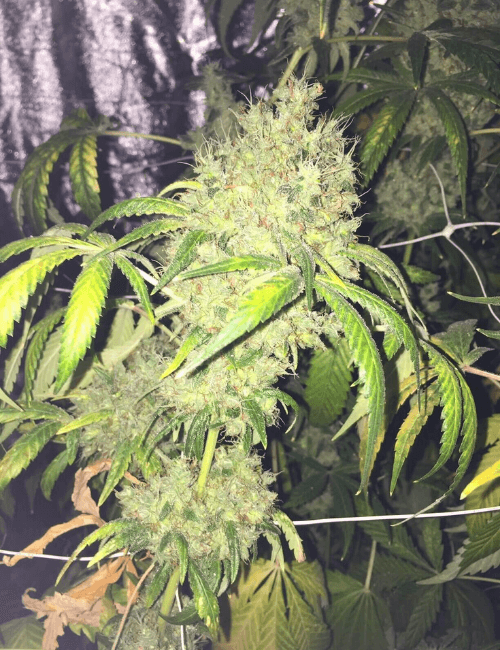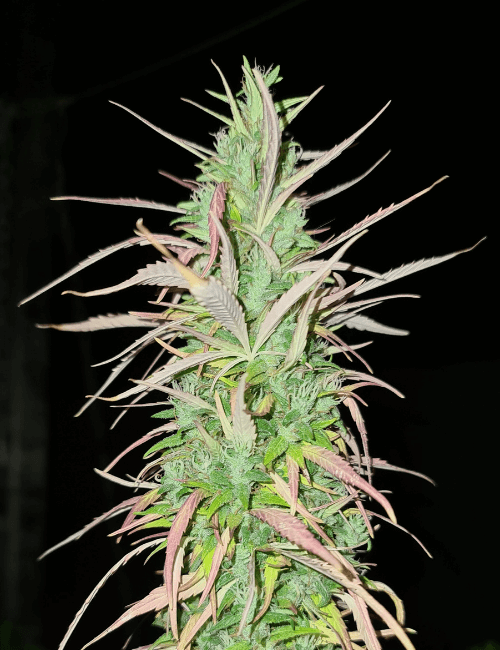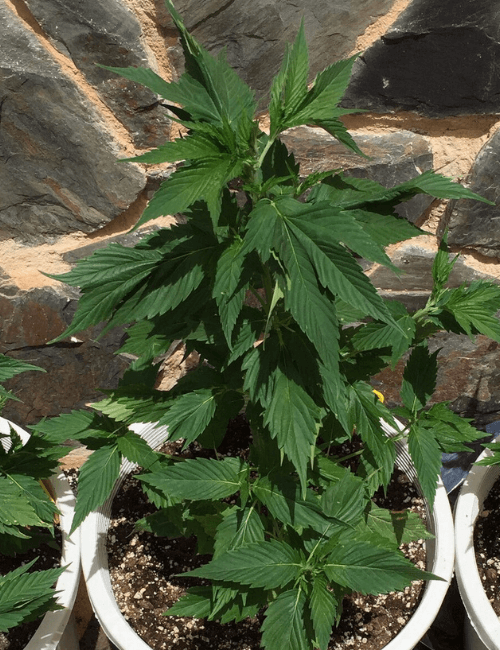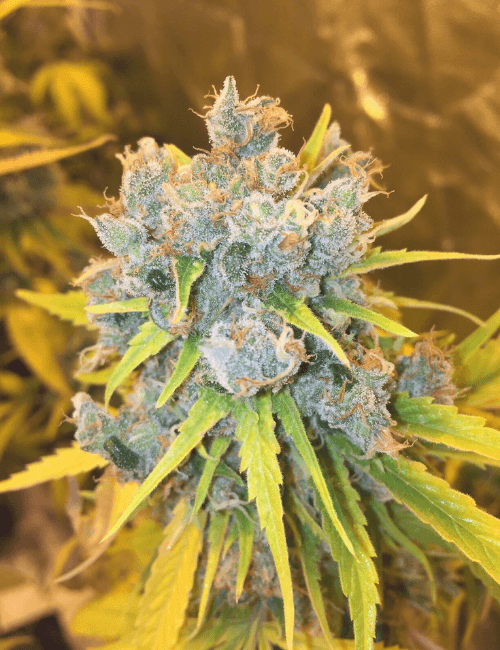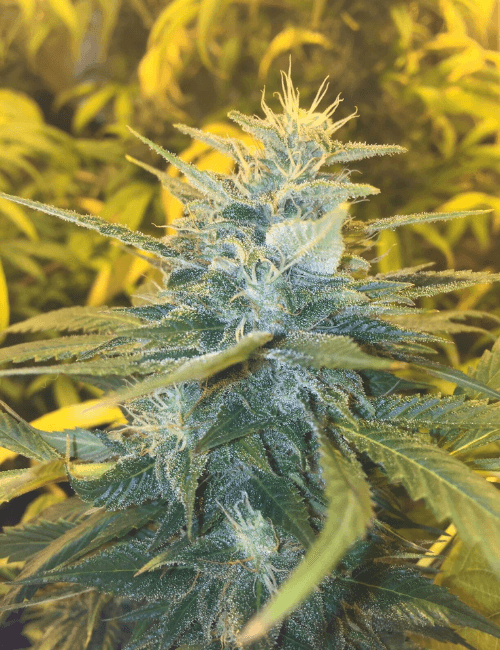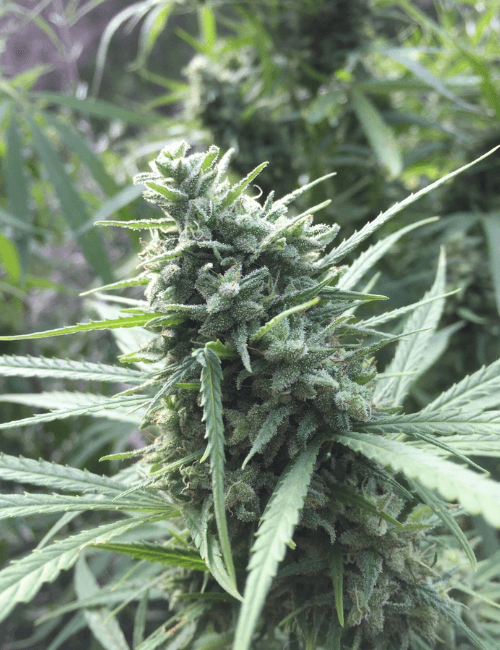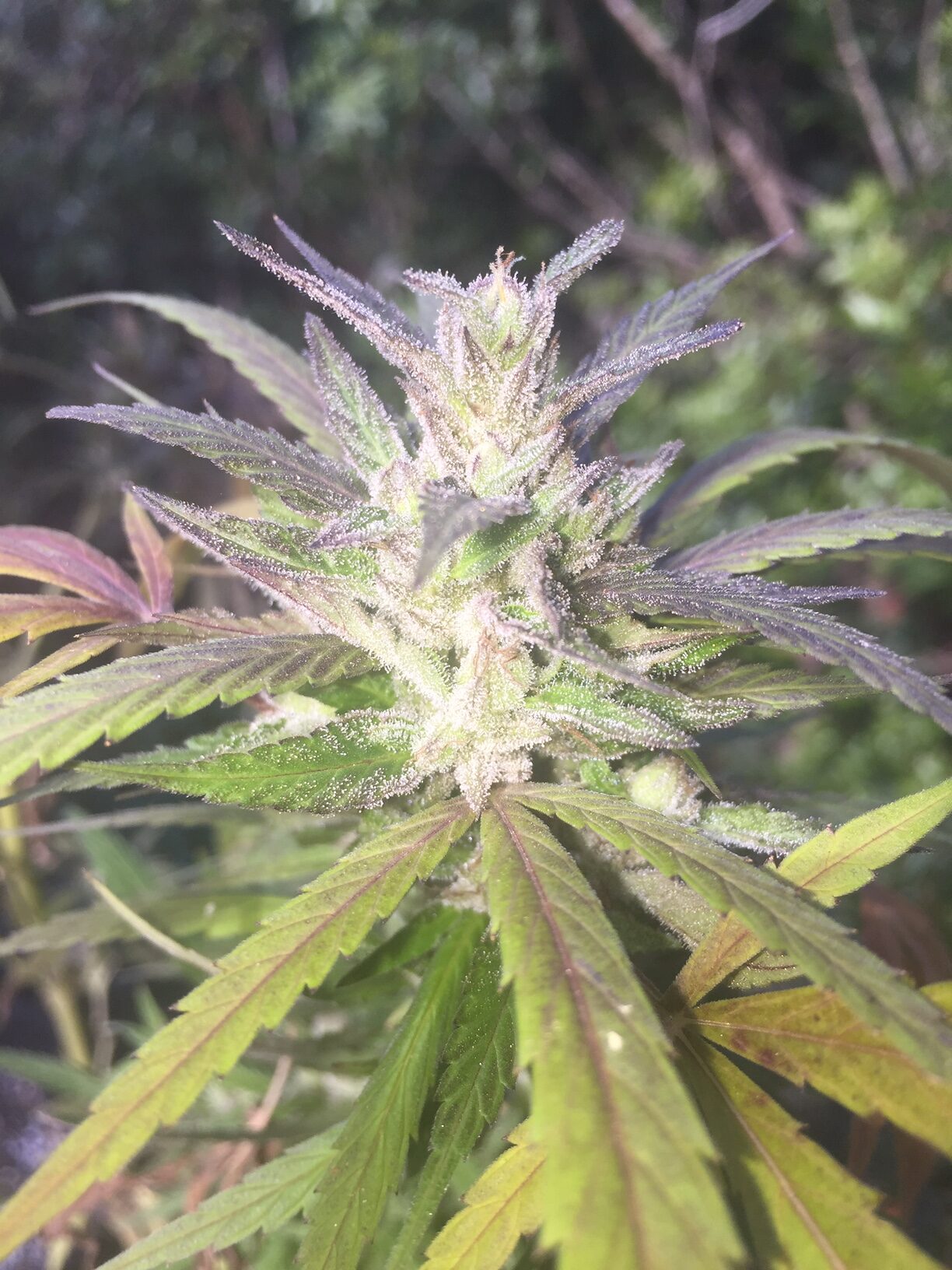-
Mutant Bastard, is our new mutant F1 genetics. To breed this hybrid we started using our selected phenotype of monofilar Ducksfoot (nettle-like leaf) and crossed it with a male Afghan haze from “Mr Nice” with hints of orange, taking it up to the fourth generation to be able to fix the foliar characters of the mother. And we finished the job by crossing it again with a selection of Ducksfoot that’s very resistant to diseases in order to restore its hybrid vigor. In this genetic line we basically find two foliar phenotypes, the typical “duck’s foot” of the Ducksfoot father and one with three-pointed forked leaves. Mutant Bastard will not grow much in height, it is a bush, with multiple strong branches that support the weight of the buds, which are not completely compact despite seeming so, this is perfect, since it makes it very resistant to fungus attacks, when the rain season comes. With a flowering time of 10-11 weeks and an orange aroma, high production and resistance to diseases and the rare leaf morphology makes it perfect to be a ninja in your garden, no one will know what’s there.
-
We are proud to introduce the first ABC mutation hybrid to the market. It’s a cross between our old Gorilla Glue S1 mother and the Australian Bastard Cannabis F20. Monster Hunter seeds produce vigorous and highly branched plants, of medium to tall height, with a medium to very large production, depending on the selected phenotype, and a high production of trichomes with very vivid aromas of fruit, turpentine and especially hops. In this version, we have made an effort to stabilize the foliar morphology of the Australian Bastard Cannabis with a result of 93% of specimens displaying this mutation. Monster Hunter stands out, in addition to its size and production, for being the most discreet in the garden, both for its morphology and for the reduced aroma of the plants. It should be noted that a few phenotypes do stand out for their smell, so from time to time a specimen with a remarkable smell can aromatize the entire garden, although it is rare. Outdoors, flowering times are from 8 to 10 weeks, with flowering beginning between July and August, and being ready for harvest between the end of September and mid-October. The commercial version of Australian Bastard Cannabis that you cannot miss. Note: Monster Hunter seeds are hard and have a hard husk which prevents the water absorbing process, but don't despair. If after a week they do not germinate, we recommend “cracking” them to facilitate germination (advice for those countries where law allows their germination).
-
This unique broadleaf pure indica from Afghanistan was introduced into Northern California in the late 1970's. Fast flowering plants with thick stems, short internodes, and excellent production of the highest quality resin. Deep Chunk's smoke is dense and full-bodied. The aromas and flavors range from skunk to pine hash, grapefruit, chocolate or coffee. Afghan Deep Chunk has earned a solid reputation as a valuable tool in many breeding programs.
-
AGOTADO TEMPORALMENTE / OUT OF STOCK TEMPORARILY
This variety is born from the crossing of the California freak show variety and the famous Sensi Durban. We have stabilized with three backcrosses to inherit the very characteristic foliar taxonomy that defines Freak Show. This strain can easily be confused with mugwort and other similar plants, making it perfect for guerilla cultivation. It shows more vigor than its predecessor thanks to the introduction of South African sativa genes. The leaves of this variety are a visual spectacle that will make even the most expert eye doubt whether it is cannabis. However, once flowering begins, this evidence diminishes due to its powerful aroma. In-fern-ho will reward us with an abundant harvest of extra aromatic buds in a period of only 9 weeks indoors and after the first week of October outdoors. Note: The seeds of this variety are very pale and do not require hydration prior to germination. -
We've always wondered what result would be obtained from crossing the commercial hybrid with the higher powered landrace. Conclusion? -Power. Maliglue is an original F1 hybrid from the cross of a selected mother of Gorilla Glue S1 and 5th generation Malawi Gold fathers. If you are looking for large numbers of potent blooms of vigorous specimens, look no further. This not only produces large and dense buds covered in resin, but also has a strong spicy and fresh aroma with hints of fruit, depending on the phenotype selected. Maliglue is easy to grow, has good vigor and is ideal for growers looking for a low maintenance line. As for flowering, we will have to wait an average of 11 to 12 weeks indoors, and until the end of October outdoors. Note: Being an F1 variety of great vigor, it is recommended to limit growth if it is grown indoors or we run the risk that the specimens occupy the entire growing space in less time than expected.
-
Autoflowering F1 hybrid. The result of crossing a Highland Thai auto male and a highly vigorous Super Silver Haze female. These specimens reach three times the size of a common autoflower, since our autoflowering lines have a growth period of approximately 1 month. After reaching sexual maturity, the plants start to flower automatically. The specimens will be ready for harvest after 14 to 16 weeks after germination producing, depending on the size of the pot used, an XXL crop of the best quality, with mainly floral and fruity aromas and spicy touches. The buds are mainly dense, forming a large central column surrounded by several smaller branches, unlike her sister, Covid-19. It is recommended to use pots of about 20L with a high percentage of porous substrate in the mix, such as coconut fibre, perlite, etc ...
-
DucksFoot, is a famous Australian breeding variety of unknown parents and with a curious mutation that causes the leaflets to be united at the base, forming a leaf similar to a duck's foot, hence its name. It's got a flowering period of 10 to 12 weeks and an incense aroma, which make it one of the favourite varieties of guerrilla growers and those users who want some discretion from prying eyes. Note: Variety suitable for breeding projects
-
Cinderella 99 is an old-school polyhybrid with fruity aromas and great production and potency, which we have brought to the seventh generation in order to stabilize the most desirable characteristics of its interesting genetics, which makes it very interesting to introduce in breeding projects. After 9 to 10 weeks you will be rewarded with the largest, densest and most powerful flower clusters that its genetics can offer you. Note: variety suitable for breeding projects.
-
Uzbekistan Hashplant is a traditionally cultivated indigenous variety that comes from the mountains of Uzbekistan, where they are cultivated by locals for hash and ganja. The first efforts were focused on eliminating any trace of hermaphroditism and sativa influence in the breeding line, obtaining very homogeneous plants with an indica structure, differentiating themselves from other landrace lines from the same area. This landrace will provide us with abundant harvests of the highest quality after nine weeks of flowering. It might acquire purple colour if we are in low temperature conditions. As a traditionally grown hashplant, it is a good option to use it for extractions, concentrates or breeding projects. Note: Variety suitable for breeding projects / Indicated for the production or extraction of concentrates.
-
Tajikistan Hashplant, is a landrace variety with origins in the traditional hashish extraction villages in the Pamir mountain range of Tajikistan where it has acquired great resistance to inclement weather. As with the Uzbekistan line, our first efforts were focused on eliminating the hermaphrodite characters so common in landrace populations, although the possibility of finding a "banana" if grown indoors is not completely ruled out. This landrace has similar characteristics to other traditionally cultivated hashplants such as Moroccan, Lebanese, or Turkish varieties, with the difference of the strech, which is slightly higher. Most of the specimens are homogeneous with a mostly indica taxonomy and short flowering, with aromas reminiscent of old school hashish adding hints of incense. This landrace will provide us with harvests of the highest quality after eight to nine weeks of flowering indoors and, at the latest, in early October outdoors. As a traditionally grown hashplant, it is a good option to use it for extractions, concentrates or breeding projects. Note: - Variety suitable for breeding projects / Indicated for the production or extraction of concentrates.
-
Our sixth generation Malawi Gold was born from the union of two Malawi Gold lines, which after several years of work we have adapted to the European climate. It is a variety that reminds us of a Christmas tree with a clearly sativa taxonomy, with medium-long internodal distance, large plants and fine leaflets with flowery tops of semi-dense to dense structure with one of the most heady effects that we have tested. Malawi Gold blooms from 12 to 14 weeks indoors and can be harvested from early to mid-November outdoors, where it shows all its potential and resistance to diseases and fungi. Note: Variety suitable for breeding projects
-
AKA Silver Leaf We rescued this variety from an old Reeferman seed pack. According to the breeder of origin, this Southeast Asian sativa grows like the Cambodian varieties rather than the Thai ones, with broad leaves that grow from this bushy plants. The seeds were originally delivered by a Vietnamese friend of the breeder who wanted to showcase the best that Vietnam had to offer. Vietnamese MindFuck grows with the classic medium-long internode sativa structure but with a wider leaf than its tropical sisters, so we suspect that its origin is in the northern areas of the country. We found two main phenotypes, the first grows with the classic sativa structure, the second is more shrubby, with a more compact and branched taxonomy. This landrace variety will reward us, after 12-14 weeks indoors or in the middle of November outdoors, with semi-compact buds loaded with an exceptionally aromatic resin. It has been successfully cultivated at 40º north. However, we recommend being attentive to the appearance of fungi given the thickness of the flowers added to the harvest time. Note: Variety suitable for breeding projects.



